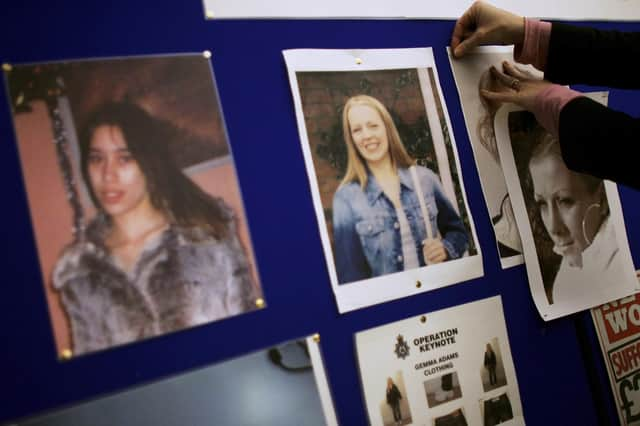Prostitution in Scotland: Why do perpetrators of what is a form of violence against women enjoy impunity? – Alan Caton


Let me be clear, then, that as a man and a former police detective, I am appalled that men in Scotland who sexually exploit women by paying for sex do so with legal impunity.
Furthermore, vulnerable women exploited through prostitution can themselves face criminal sanctions for soliciting. This legal approach to prostitution is unjust and counterproductive.
Advertisement
Hide AdAdvertisement
Hide AdMy experiences as the detective who led a multi-agency response to dealing with prostitution after a sex buyer murdered five women taught me that legal models which fail to deter men’s demand and support women to exit prostitution are fatally flawed. Here’s why.
Men who pay for sex are not ordinary ‘consumers’ availing ‘workers’ of their services, nor are they helplessly responding to uncontrollable sexual urges. These men are choosing to perpetrate sexual exploitation. They can and must be stopped.
Offering a person money – or food, or accommodation, or a job – on the condition that they perform sex acts is sexual coercion. Most men do not pay for sex, but the minority who do cause enormous harm and suffering to those they exploit.
Men’s demand for prostitution is also responsible for fuelling a brutal sex-trafficking trade in Scotland. Let’s not forget, the profits that sex traffickers make come directly from the pockets of men who pay to abuse their victims. To stop sex trafficking and sexual exploitation, we have to confront and combat men’s demand for it.


How do we do that? A fundamental first step is to put in place a legal model that deters perpetrators, holds offenders to account, and supports victims. That is not what Scotland’s laws do at present.
Right now, paying for sex is legal, commercial pimping websites which facilitate prostitution are legal, while women exploited through the sex trade can face criminal sanctions for soliciting.
To deter demand, the Scottish government must shift the burden of criminality off victims and place it where it belongs – on those who perpetrate and profit from this abuse.
Criminalising the act of sexually exploiting a person by paying for sex will not, of course, eradicate this harmful behaviour in and of itself – just as laws prohibiting rape and domestic abuse have not eradicated those forms of men’s violence.
Advertisement
Hide AdAdvertisement
Hide AdYet we recognise that laws prohibiting rape and domestic violence, as well as their proper implementation, are an indispensable part of society’s efforts to deter those abuses. And so it is in the case of deterring men’s demand for prostitution.
Having spent 30 years in policing, I have heard all manner of excuses designed to minimise, justify and avoid accountability for men’s violence against women. "It’s a private matter – don’t get involved.” “If you arrest him, he’ll punish her for it when he gets home.” “If it was that bad she’d leave.”
Similar claims are used to oppose holding men accountable for paying for sex. "It’s between consenting adults.” “You’ll just make it more risky.” “It’s her choice – who are you to interfere?”
There have been important advances in society’s understanding of violence against women in recent years, particularly in relation to domestic abuse. And yet, in the case of men’s sexual abuse of women through prostitution, too many still accept that as a society we should be a bystander to this form of violence against women – because of threats of what men may do if we try to stop them. It’s straight out of the perpetrator’s playbook.
There is nothing inevitable about the prostitution trade. It exists because a minority of men feel entitled to pay for sex – and I know from my work in the police that demand can be deterred.
In 2006, after five women were murdered in Ipswich by Steve Wright – a local, regular sex buyer – I was responsible for leading a multi-agency strategic response to remove prostitution from the streets of Ipswich. Turning a blind eye to the prostitution trade was never an option.
It was abundantly clear that the sex trade is inherently abusive and dangerous, and that simply arresting women for soliciting on the streets is counterproductive. Instead, we cracked down on demand, taking a zero-tolerance approach to kerb-crawling (which is currently a crime) and sent out a clear message to the public that paying for sex on the streets of Ipswich would not be tolerated.
We also made every effort to divert women away from the criminal justice system and worked with local agencies to support women to exit prostitution and start the process of recovering and rebuilding their lives.
Advertisement
Hide AdAdvertisement
Hide AdThe results speak for themselves: an independent evaluation by the University of East Anglia confirmed that we ended street prostitution and that it was not merely displaced. Instead, a multi-agency partnership worked with women to help them access support and successfully find alternatives to prostitution. While our approach required new resources, for every £1 spent as part of the strategy we ultimately saved £2 – by reducing the burden on courts and social support systems.
Ultimately, however, we were prevented from deterring men from sexually exploiting women in off-street locations because it is not currently a criminal offence. That is not the case in Ireland, Northern Ireland, Sweden, Iceland, Norway, Israel and France.
These countries have all criminalised paying for sex and decriminalised victims of sexual exploitation. They recognise that to combat sex trafficking and sexual exploitation, you have to combat the very thing that drives it: demand from men who pay for sex.
It’s time for Scotland to bring its outdated prostitution laws into the 21st century by providing support, not sanctions, to victims – and ending impunity for exploiters.
Alan Caton OBE is a former detective superintendent of Suffolk Constabulary. He is speaking at a webinar called Men who pay for sex: How to challenge demand for prostitution today. For details visit www.amodelforscotland.org.
